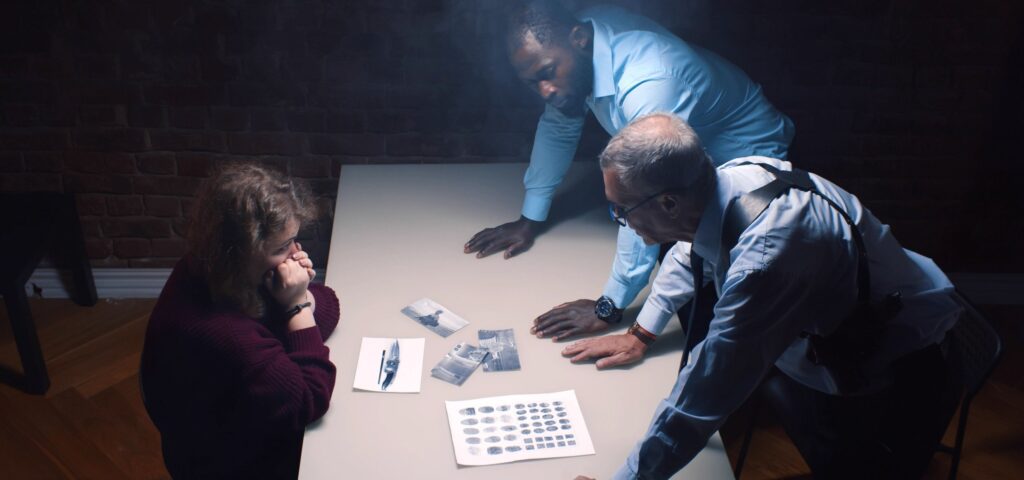What To Do If I’m Wanted For Questioning in Missouri
If the police or any other form of law enforcement contact you or ask you to come to the station, you have the right to remain silent under the law.
If you feel as though a police officer is being overly accusatory, if you suspect you could be in trouble, or if you are questioned by law enforcement but not charged with crime, there are steps you can take to protect yourself. The first one is to call Combs Waterkotte at (314) 900-HELP or contact us online for a free consultation with one of our St. Louis criminal defense attorneys.
What Are My Rights When Questioned by Law Enforcement?
Anyone under suspicion of a crime has no obligation whatsoever to speak to law enforcement. “You have the right to remain silent” isn’t a made-for-TV-or-the-movies, meaningless expression, it’s a legal right, among your Miranda rights. The line immediately after that – “Anything you say can and will be used against you in a court of law” – should discourage anyone from thinking of having a casual conversation with law enforcement.
You can’t be penalized for failing to respond to a question from law enforcement. Also, under Missouri Revised Statute § 544.170, law enforcement can only hold you for 24 hours.
Three Types of Police Questioning Seen in St. Louis, Throughout Missouri
Whenever a police or law enforcement officer questions someone, an explanation of rights and obligations is required. There are different rules for each the following situations:
- A voluntary encounter is a situation where a suspect is free to leave whenever he or she wishes to do so. This type of questioning does not require any proof or a warrant. A situation ceases to be voluntary the second an officer indicates that a suspect can’t leave.
- A temporary detention occurs when law enforcement has reasonable suspicion to believe a crime has been committed and the person being questioned was involved. Even common behaviors can be grounds for reasonable suspicion.
- If an officer has probable cause to believe that a suspect has committed a crime, an arrest can take place. This takes a situation beyond simple questioning and implicates serious criminal issues. Speak with a St. Louis, MO criminal defense lawyer at Combs Waterkotte right away. Call us at (314) 900-HELP or reach out to us online.
Even if you are arrested despite being completely innocent of the alleged crime, law enforcement will take action if they have even the slightest reason to believe evidence links you to a crime. You can always ask an officer, “Am I free to leave?” If the answer is yes, walk away. If the answer is no, you do not have to answer any questions or provide a statement. Combs Waterkotte can handle things moving forward.
Common Police Interrogation Tactics Seen in St. Louis, Throughout Missouri
When investigating a crime, police commonly attempt to speak with as many people as possible. Investigators undergo intensive training to acquire the best tactics for leaning in on people and eliciting information. Common police interrogation tactics our St. Louis criminal defense attorneys have seen include:
- Good cop, bad cop: One police officer uses abrasiveness with you while the other plays the part of a caring, pleasant person, providing a sympathetic ear. This is typically used to bait you into feeling comfortable.
- “We’re just trying to clear things up:” An officer might tell you that you’re not in any trouble and that the officer is just trying to figure things out or get your side of things. Make no mistake though, that officer is trying to elicit information that can later be used against you.
- Threats: If you refuse to tell them what happened, officers might threaten to investigate family members, friends, or associates. Stay strong, and don’t fall into their trap.
- Coercion: The cops may tell you that talking to them will keep your loved ones out of trouble or that they can get a subpoena to force you to come in for questioning. Coercion is illegal. If you believe this has happened to you, call a Combs Waterkotte criminal defense attorney right away at (314) 900-HELP or contact us online.
One thing is certain – law enforcement investigators will use whatever you say against you if they believe it will assist them in proving their case. Whatever unethical techniques the police use when attempting to question you, stand your ground and assert your right to stay silent and politely request an attorney. A St. Louis Combs Waterkotte defense lawyer can help protect you against illegal police interrogations and investigations.
How Do I Legally Decline Answering Questions From St. Louis Law Enforcement?
Because it is within your constitutional rights to remain silent, you can gently and politely inform law enforcement two things:
- I am asserting my right to remain silent.
- I would like to speak with an attorney.
If you state these two things, law enforcement will relieve you of all responsibility to talk. They are not permitted to ask you any further questions. If they keep putting pressure on you, coercing you, lying to you, and telling you that talking to them is in your best interest, remain silent and, at the first possible chance, call Combs Waterkotte at (314) 900-HELP.
What To Do If I’m Wanted For Questioning in Missouri | Contact Combs Waterkotte
If you have been contacted by law enforcement for questioning, hiring an attorney is the best way to protect yourself from harm, even if you don’t think you have anything to worry about. The criminal defense team at Combs Waterkotte can help you navigate through this daunting process. Our St. Louis criminal defense lawyers can step in and defend you before you even speak a word. When your future is hanging in the balance, you need the best possible lawyer standing in your corner.
Call a Combs Waterkotte St. Louis criminal defense attorney today at (314) 900-HELP or contact us online for a free, confidential case review.







